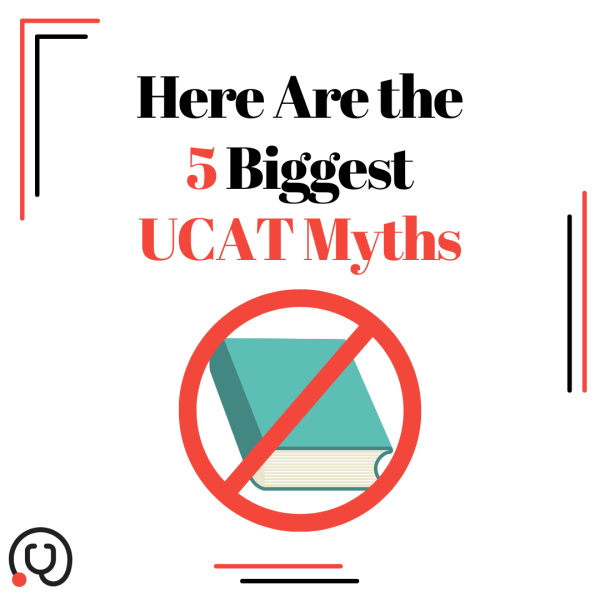10 Biggest UCAT Myths

11 months ago by Chris
As one of the crucial components of medical school admission in Australia, the UCAT generates plenty of discussion—and unfortunately, quite a few misconceptions.
Whether you're a high-achieving student confident in your academic prowess or someone just starting to plan their UCAT preparation journey, it's essential to separate fact from fiction. In this blog, we'll debunk ten widespread myths about the UCAT that could be holding you back from achieving your best possible score.
Myth 1: UCAT scores aren’t important if you have a solid academic background
Even medical school applicants who get perfect academic scores can flake out on the UCAT and miss out on a place in medicine. The UCAT is one of three important elements of your medical school application (the other two being your academic results and interview), so it is vital that you take the UCAT seriously and aim to score as highly as possible.
Myth 2: Six weeks is enough to prepare for UCAT
The UCAT Consortium claims that six weeks is sufficient time to prepare for UCAT. That may well be so in the UK where students can spend 6 weeks full time preparing for UCAT during their summer holidays. In New Zealand, students sit UCAT during the middle of their busy university studies. The most effective way to prepare for UCAT is by distributed practice.
Myth 3: If you’re not sure, you should leave the answer blank
Another myth is that points are only earned on correct answers in UCAT. While this is true, it is important to note that the UCAT also does not penalise wrong answers, so there is no reason to leave any UCAT question blank. If you have less than a minute to go and several questions left in a UCAT subtest, choose your favourite letter for the rest of the questions and guess. You've got between a 50% and 20% chance of getting it right (depending on the UCAT subtest and question), but getting it wrong will not hurt your score. For more information on UCAT scoring, check out our blog series.
Myth 4: Preparing for the UCAT won’t help you
It is a myth that you should not or cannot prepare for UCAT. UCAT is an extremely challenging, 2 hour exam with unfamiliar questions, so preparation is essential. Taking a high-quality UCAT prep course is beneficial in many ways. Quality UCAT preparation courses provide proven strategies, UCAT practice exams/questions, common UCAT tricks and insights from UCAT experts. Furthermore, the generic thinking and test taking skills you develop during your UCAT preparation will help boost your academic performance as well.
Myth 5: Raw UCAT scores matter
The UCAT is a statistically equated and scaled test, which means getting a certain UCAT score is just as hard from test to test (whether test A, B or C in a UCAT year or a test one year compared to the next). Raw scores (the number of questions you got right) do not matter. What matters is how you score in relation to other students. For more information on UCAT scoring, check out our blog series.
Myth 6: You can only sit UCAT in first year of university
You can sit UCAT in your final year of schooling and any year thereafter. Therefore, as a New Zealander, you can sit UCAT in year 13, and again in your first year at university. There are many advantages to sitting UCAT in year 13. You can also sit UCAT during a gap year, during your university studies and/or after completing your undergraduate degree.
Myth 7: C is the Best Letter to Guess
Unfortunately, there’s no way to predict which letter is the most prevalent on any subtest of UCAT. You do, however, have a much better chance of getting the correct answer if you can narrow the options down by eliminating obviously incorrect answers before guessing (i.e. making an educated or strategic guess). Techniques for making strategic guesses are covered in detail in MedEntry’s UCAT courses.
Myth 8: UCAT Situational Judgement is not important
While most universities place most emphasis on the cognitive UCAT subtests (UCAT Verbal Reasoning, UCAT Decision Making and UCAT Quantitative Reasoning) some universities also consider Situational Judgement. Others may use it as a tie breaker, or to eliminate those who score poorly. Some universities are not transparent about whether and how they will use UCAT Situational Judgement results. Furthermore, university admissions criteria do change, often without notice. In the case of unforeseen circumstances (for example, cancellation of interviews) it is possible universities may use UCAT Situational Judgement scores instead.
Myth 9: A high UCAT score guarantees admission into the best medical schools
A near UCAT perfect score is generally helpful for getting into a top medical school, but it won’t guarantee a spot at most universities. UCAT is one of three major criteria for getting into medicine (the other two being interview performance and academic results). No matter what medical school you are applying to, you want to show the admissions committee that you are an outstanding, well-rounded candidate. Take the rest of the application criteria, particularly your interview, as seriously as you take your UCAT score.
Myth 10: Your UCAT score is only used for admissions purposes
If you score highly enough in UCAT to attract the attention of multiple medical schools, you may be rewarded with scholarships. Some medical schools consider UCAT scores when choosing merit-based scholarship recipients. Just another reason to take your UCAT preparation seriously!


